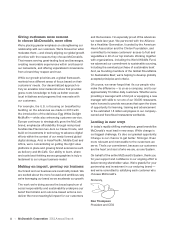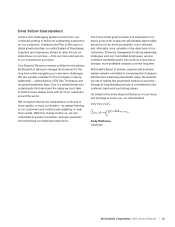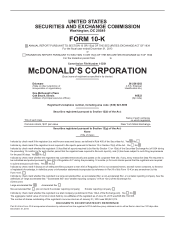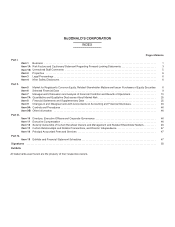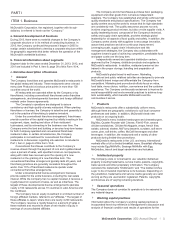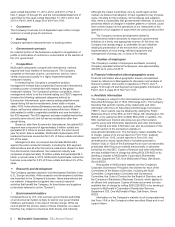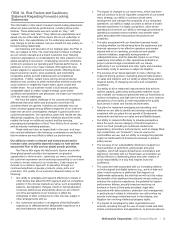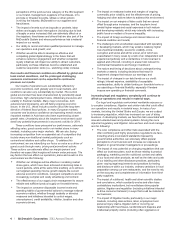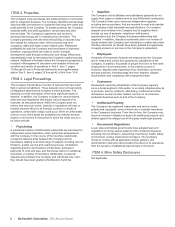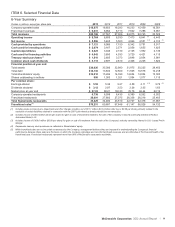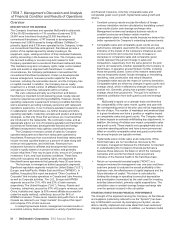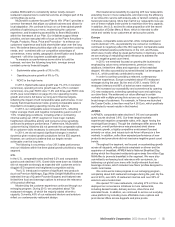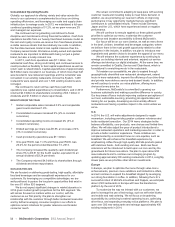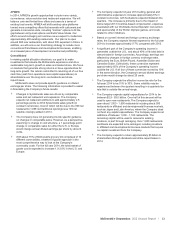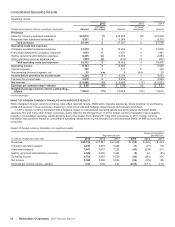McDonalds 2013 Annual Report Download - page 14
Download and view the complete annual report
Please find page 14 of the 2013 McDonalds annual report below. You can navigate through the pages in the report by either clicking on the pages listed below, or by using the keyword search tool below to find specific information within the annual report.
6 | McDonald’s Corporation 2013 Annual Report
ITEM 2. Properties
The Company owns and leases real estate primarily in connection
with its restaurant business. The Company identifies and develops
sites that offer convenience to customers and long-term sales and
profit potential to the Company. To assess potential, the Company
analyzes traffic and walking patterns, census data and other
relevant data. The Company’s experience and access to
advanced technology aid in evaluating this information. The
Company generally owns the land and building or secures long-
term leases for restaurant sites, which ensures long-term
occupancy rights and helps control related costs. Restaurant
profitability for both the Company and franchisees is important;
therefore, ongoing efforts are made to control average
development costs through construction and design efficiencies,
standardization and by leveraging the Company’s global sourcing
network. Additional information about the Company’s properties is
included in Management’s discussion and analysis of financial
condition and results of operations in Part II, Item 7, pages
10 through 25 and in Financial statements and supplementary
data in Part II, Item 8, pages 25 through 42 of this Form 10-K.
ITEM 3. Legal Proceedings
The Company has pending a number of lawsuits that have been
filed in various jurisdictions. These lawsuits cover a broad variety
of allegations spanning the Company’s entire business. The
following is a brief description of the more significant types of
lawsuits. In addition, the Company is subject to various federal,
state and local regulations that impact various aspects of its
business, as discussed below. While the Company does not
believe that any such claims, lawsuits or regulations will have a
material adverse effect on its financial condition or results of
operations, unfavorable rulings could occur. Were an unfavorable
ruling to occur, there exists the possibility of a material adverse
impact on net income for the period in which the ruling occurs or
for future periods.
Franchising
A substantial number of McDonald’s restaurants are franchised to
independent owner/operators under contractual arrangements
with the Company. In the course of the franchise relationship,
occasional disputes arise between the Company and its
franchisees relating to a broad range of subjects including, but not
limited to, quality, service and cleanliness issues, contentions
regarding grants or terminations of franchises, delinquent
payments of rents and fees, and franchisee claims for additional
franchises or rewrites of franchises. Additionally, occasional
disputes arise between the Company and individuals who claim
they should have been granted a McDonald’s franchise.
Suppliers
The Company and its affiliates and subsidiaries generally do not
supply food, paper or related items to any McDonald’s restaurants.
The Company relies upon numerous independent suppliers,
including service providers, that are required to meet and maintain
the Company’s high standards and specifications. On occasion,
disputes arise between the Company and its suppliers which
include, by way of example, compliance with product
specifications and the Company’s business relationship with
suppliers. In addition, disputes occasionally arise on a number of
issues between the Company and individuals or entities who claim
that they should be (or should have been) granted the opportunity
to supply products or services to the Company’s restaurants.
Employees
Hundreds of thousands of people are employed by the Company
and in restaurants owned and operated by subsidiaries of the
Company. In addition, thousands of people from time to time seek
employment in such restaurants. In the ordinary course of
business, disputes arise regarding hiring, termination, promotion
and pay practices, including wage and hour disputes, alleged
discrimination and compliance with employment laws.
Customers
Restaurants owned by subsidiaries of the Company regularly
serve a broad segment of the public. In so doing, disputes arise as
to products, service, incidents, advertising, nutritional and other
disclosures, as well as other matters common to an extensive
restaurant business such as that of the Company.
Intellectual Property
The Company has registered trademarks and service marks,
patents and copyrights, some of which are of material importance
to the Company’s business. From time to time, the Company may
become involved in litigation to protect its intellectual property and
defend against the alleged use of third party intellectual property.
Government Regulations
Local, state and federal governments have adopted laws and
regulations involving various aspects of the restaurant business
including, but not limited to, advertising, franchising, health, safety,
environment, zoning, employment and taxes. The Company
strives to comply with all applicable existing statutory and
administrative rules and cannot predict the effect on its operations
from the issuance of additional requirements in the future.
ITEM 4. Mine Safety Disclosures
Not applicable.


